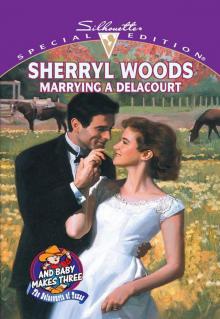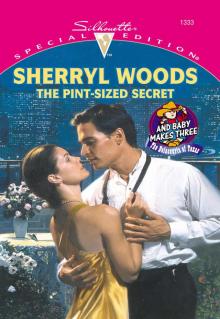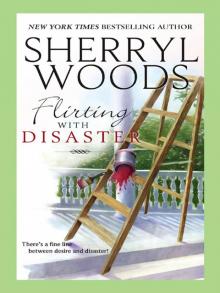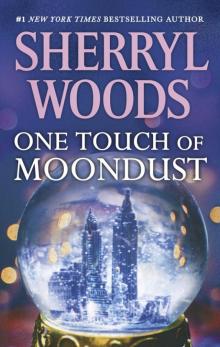- Home
- Sherryl Woods
The Calamity Janes Page 13
The Calamity Janes Read online
Page 13
He stared at her. “You’re asking me? Why?”
“Because you probably hear things they wouldn’t say to me. I just want to know what I’m likely to be up against when we go to court. What’s the popular sentiment? And how are you going to cover it in the paper?”
It grated on him to admit that most of the people he’d spoken to had been unswervingly on Sue Ellen’s side. Though he’d listened to the remarks without comment, he’d wanted badly to explain that a man was dead because of what had happened that night. How could that be an acceptable solution, no matter what the provocation? He just couldn’t see Sue Ellen being eligible for sainthood, the way some of her neighbors seemed to think she should be.
“I think most people understand what Sue Ellen did. They’ve known her for years. They want to believe what happened was an accident. Many of them believe that Donny got what he deserved in any case,” Ford conceded grimly.
“You don’t agree?”
“Did he deserve to die?” Ford demanded, tossing the question back at her. “Does anybody have the right to take another person’s life?”
“He was threatening her with a gun,” Emma said sharply. “What would you have had her do? Maybe try to reason with him? Let him shoot her?”
“No, of course not, but there had to be a better way.” He believed with everything in him that resorting to violence was never an answer.
“You tell me what that would have been,” she said impatiently. “Name one thing she could have done.”
“She could have left,” he said, though even as he spoke the words, he knew he was oversimplifying. Emma wasn’t likely to hesitate to tell him exactly that, either.
“She tried,” Emma reminded him. “Donny came after her. The struggle went out into the street, remember? Then she tried to get inside so she could lock him out. He followed her.”
“I’m not talking about that night. I’m talking about weeks earlier—or months earlier. Maybe even years earlier.” To him, it was so clear-cut: If someone was hurting you, physically or emotionally, you got away. You didn’t stay and take it.
“Just like that?” Emma asked mockingly. “Assuming she was brave enough to make the break, where would she have gone that he couldn’t have found her? Who would have taken her in, knowing that Donny would be on the warpath? And he would have been—make no mistake about that. After all, it was that violent possessiveness that was behind every beating.”
“I’m sure there are plenty of people who were willing to protect her,” Ford insisted, though his certainty of that was wavering.
“A few,” Emma corrected. “Most wouldn’t get involved if it meant putting their own families at risk, and who could blame them? Many of Sue Ellen’s friends our age have children at home. How could they knowingly endanger them, even to protect Sue Ellen?”
Ford tried a different tack. “She could have gone to Ryan for protection.”
“She could have,” Emma conceded slowly.
Surprised by the concession, he asked, “Okay, then, at last we agree about something. Why didn’t she go to Ryan?”
Emma’s expression was thoughtful as she considered the question. “I think there’s a whole other dynamic at work there,” she began at last. “Ryan may be the sheriff, but he’s also an unmarried man who has very strong feelings for Sue Ellen. He has ever since high school, but she was always Donny’s girl. I suspect she understood Ryan’s feelings and feared that she would be endangering him if she got him involved. After all, Donny’s biggest problem, aside from alcohol, was his jealousy. Ryan was the target of it as often as not. On some level Donny knew that Ryan cared about Sue Ellen, even though Ryan was very careful never to let it show. There was bad blood between them as a result. It had been that way for years.”
Ford had guessed as much, both from what Ryan had said and what he hadn’t said. He was surprised Ryan had remained as calm as he had when he’d intervened between Sue Ellen and Donny the night of the dance. He was equally surprised, under the circumstances, that Donny had left with Ryan peacefully.
“Still,” he said, “if Sue Ellen had filed charges even once, Ryan could have arrested Donny.”
“Let me ask you something. When you were a kid, did you ever have a best friend who was a screwup?”
Ford thought back to Cory Sullivan. Cory had gotten into more mischief than any other kid in their small Georgia town. It hadn’t been long before innocent mischief turned into something more serious—vandalism, for starters, then shoplifting. He’d pleaded with Cory to stop before he ruined his life.
“Well?” Emma prodded.
“One,” he admitted.
“Did he get in a lot of trouble?”
“Oh, yeah.”
“Did you ever turn him in? Stop being friends with him?”
He saw where she was going with this. “No, but it’s not the same. The only person Cory was endangering was himself.”
“Are you sure no one else ever got hurt thanks to his actions?”
Ford swallowed hard. There had been one person. Cory had beaten up old man Jensen because the grocer had tried to stop him from stealing cigarettes and beer from his store.
“Just once that I know of.”
Her gaze locked on his. “Could you have prevented it by turning him in before it came to that?”
“Possibly.”
“So who was guiltier—you or your friend?”
“Cory, of course. He committed the crime.”
Her smile didn’t quite reach her eyes. “And Donny committed this one. Not Sue Ellen. He beat her over and over and over. Would it have been better if she’d had him arrested? Of course. But she loved him. She wanted to believe he would change, just as you wanted to believe your friend would change.”
“Are you saying she was right to stay and take it?”
“Absolutely not,” she said fiercely. “I’m just saying that it’s understandable, that it happens all too often, either because the victim is scared or has such low self-esteem that she blames herself for what’s happening, or because she keeps clinging to a false hope that things will get better—if only she’s nicer, better, less confrontational, whatever. With Sue Ellen it was that unwavering faith that her love could make Donny change. I’m sure they had good patches. That only convinced her she was right, that underneath he was a good man.”
“Was he? Do you remember him from high school?” Ford asked. “Were the signs there then that he would be an abuser?”
“Honestly, yes. He was always jealous and possessive. And his own father had a reputation as a mean drunk. Donny was all but preordained to be violent.”
“Did any of Sue Ellen’s friends try to warn her?”
Emma’s expression turned sad. “I don’t think any of us recognized what those signs meant, not back then. My perception is based on hindsight and what I’ve learned about domestic violence more recently.”
Ford glanced at her, but she evaded his look. “Emma?”
“What?” she asked, still not looking at him.
“Why is this case so personal to you?” he asked, almost dreading the answer. Once again, he feared he knew what it might be—that her husband had been abusive, and that she had stuck it out longer than she should have.
“Because Sue Ellen is a friend,” she said tersely.
“And that’s the only reason?”
She turned then and met his gaze. She even managed to hold hers steady. “What other reason could there be?”
Ford debated with himself before responding with the question that was really on his mind. It was exceptionally personal and he wasn’t sure he had any right to ask it yet, but he had a feeling it was critical to understanding Emma. Finally he chose a circumspect approach that might elicit the truth…if Emma was willing to share it.
“Tell me about your marriage,” he suggested mildly, thinking of her mother’s comment that Emma’s husband had thought he could change her. In what way had Kit Rogers found her deficient? And how had he
handled it?
Even though he considered his question to be innocuous, alarm flared in Emma’s eyes.
“I don’t know what you want to know,” she said, looking uneasy.
Staying determinedly on neutral turf, he focused on the beginning of the relationship, not the end, and asked, “How did you meet?” Though he’d heard the story from Ryan, he wanted Emma’s take on it.
“Right here in town, ironically, though we were both in the same law school. Kit was dating Ryan’s sister, Adele. We met at a party during a school break.”
“That must have been awkward.”
She nodded. “It could have been, but Adele and I talked. She said she wasn’t upset about it, so Kit and I started to see each other.”
“How long did you know each other before you married?”
“A year.”
“Then you got married when you got out of law school?”
“No, when he got out. I still had another year.”
“And Caitlyn, when did she come along?”
“Right after I graduated. Kit was already doing very well. He’d had a couple of high-profile cases that had gone really well—his career was on a fast track.”
“Did you consider staying home, instead of going to work?”
She frowned at the question, probably without any idea of how much she was giving away by that simple reaction. “No,” she said, her voice suddenly tight.
Ford was feeling his way now, trying to step lightly through what was clearly a minefield. “How did your husband feel about that?”
“He wasn’t happy,” she admitted candidly. “Look, I really don’t like to talk about this. I don’t see what it has to do with anything, anyway.”
He smiled. “It’s called getting to know each other, Emma. I ask you a few questions. You answer. Then you ask me questions and I answer.”
“Okay, then, you’ve had your turn. Let’s switch,” she said a little too eagerly.
Ford knew better than to pursue his own line of questioning, but he was satisfied that he was on the right track. Emma more than understood Sue Ellen’s plight. In one way or another, she had lived it. The thought made him shudder. Please, God, he prayed, let it have been emotional abuse over the work issue, not physical abuse. But even as he mentally uttered the prayer, he had to wonder if the scars were likely to be any less deep.
When she woke up the next day, Emma was still shaken by her conversation with Ford the night before. He had come far too close to discovering the truth about her marriage. Even as wary as she was, she had found herself answering questions she normally called a halt to much sooner. In the end, though, she hadn’t wanted him to know just how rough a time she’d had during the months before she and Kit had finally called it quits. If Ford knew, he might pity her, and that was the last response she wanted from him.
To get her mind off her own problems, she left the house early in the morning and went in search of her brother. When she didn’t find him in the barn or stables, she saddled one of the horses and rode out looking for him. It almost didn’t even matter whether she found him. The physical exertion of riding combined with the rugged landscape worked like a balm to help her forget just how disconcerting Ford could be and how much she was coming to count on his presence in her life.
She was riding over the rough terrain of the foothills when she spotted Matt and several of the other men with the herd of cattle. Her brother saw her, waved and rode over.
“What brings you out here?”
“Clearing the cobwebs,” she said. “Besides, Matt, you and I haven’t had much of a chance to talk since I’ve been home. Even when you come by to see Dad, you don’t stick around.”
He bristled at once. “Meaning?”
“That you’re my brother, and I think you’re avoiding me. I want to know what’s up with you.”
He scowled at her. “Why does anything have to be up with me?” He took off his hat and slapped it against his thigh. “Dammit, Em, I don’t have time for this.”
Emma scowled right back at him. “‘This?’ What does that mean? I’m not cross-examining you. I’m asking how you’re doing. Is that a problem?”
Matt sighed. “Sorry,” he mumbled defensively. “I’m a little touchy lately.”
“No kidding,” she said, keeping her tone determinedly light. “Why is that?”
“Because Martha and Mom are nagging at me every time I turn around.”
“About?”
“Whether I’m happy, what I want to do with my life, et cetera, et cetera. I’m getting sick of it. I don’t understand why they can’t just let things alone. I’m working here for Dad. End of story.”
“Is it?” Emma asked mildly. “Is it the end of the story?”
“Not you, too?” he said, regarding her with disappointment. “Who put you up to this? Mom or Martha?”
“Nobody put me up to anything,” she chided. “Sisters can figure out all on their own when something’s not right. I’ve never seen you so short-tempered and moody before.” Suddenly she had a thought that nobody else seemed to have considered, or else had refused to verbalize. “You’re not involved with another woman, are you, Matt?”
“Good grief, no,” he said.
He was staring at her so incredulously that Emma was instantly relieved.
“Have you lost your mind?” he demanded. “When would I have time, for one thing? For another, I love my wife, even if she is a damned nag.”
Emma grinned. “Glad to hear it. Now let’s get to the bottom of what’s really wrong. Martha thinks you’re not happy working the ranch.”
“Martha has a big mouth.”
“Mom agrees.”
He frowned but resisted any temptation to criticize their mother.
“Are you unhappy?” Emma asked.
“This is what I do,” he said.
She regarded him with exaggerated patience. “That’s not what I asked. Are you happy being a rancher?”
“Okay, if you want the unvarnished truth, the answer is no. Are you satisfied? The bottom line is, I hate this but Dad needs me here, and that’s that.”
“That is not that,” Emma retorted. “Tell him. Do you know what you’d rather do? Do you want to go to college?”
“Emma, that’s a pipe dream. I have a wife. I have kids. And I have a job working for a man I can’t abandon as easily as some other people did.”
She winced at that. “Dad got over my leaving. He accepted Wayne’s choice.”
“Wanna bet? One of these days ask him about the blueprints he has stashed in his desk.”
“Blueprints?”
“For your house and for Wayne’s. He picked out the rise just beyond the main house for you. Wayne’s would have been about five hundred yards from mine, overlooking the creek.”
Tears stung Emma’s eyes. She’d had no idea. “I didn’t know,” she whispered.
“Of course you didn’t, because you were hell-bent on getting away and doing what you damned well pleased. I watched Dad die inside every time you left to go back to school, but even then he held out hope that someday you’d be back. Even when you got married, I think he thought you and Kit would settle here after you’d graduated. Not until the day you went to work for that law firm in Denver did he finally give up and accept the truth that you were never coming home.”
“I did what I had to do,” Emma said in her own defense.
“Yeah, and it’s made you real happy, hasn’t it? I see the haunted look in your eyes, sis. You’re on a merry-go-round and you’re miserable, but you just haven’t figured out how to get off.”
Emma had ridden out here today to help Matt face a few hard truths about his life, but he’d turned the tables on her. Now she was the one suddenly consumed with painful regrets.
“Perhaps you’re right,” she said softly.
“Well, when you get your own life straightened out, maybe then I’ll let you have a crack at mine,” Matt said, then turned and rode away.
It was just as well. Emma was pretty much speechless anyway.
Chapter 11
“Mommy, is Ford going to be my new daddy?” Caitlyn asked as she spooned cornflakes into her mouth on Sunday morning.
“No, absolutely not,” Emma snapped. After her disconcerting conversation with Matt, this was absolutely the last thing Emma needed today. She swallowed hard when she realized that Caitlyn’s eyes were brimming with tears. “I’m sorry, baby. I didn’t mean to yell.”
“I like him,” Caitlyn said with a sniff. “I want him to be my new dad. Besides, if you married him, we could live here.”
Emma didn’t have the patience or the words to explain all of the flaws in her daughter’s logic. What worried her most, though, was how eager Caitlyn was to claim Ford as a father. The two of them had only spent one day together, yet Caitlyn was already making up fantasies about him. That suggested she was desperate for a replacement for the man who paid no attention to her back in Denver.
“Baby, you don’t really know Ford all that well,” Emma explained. “Before somebody can be your daddy, we both have to get to know him and make sure he’s the right person.”
“I know he is,” Caitlyn said, regarding her seriously.
“What makes you so sure?” Maybe her six-year-old daughter had insights that would help her see Ford in a new light. How pathetic was that?
“Because he was really, really nice to me,” Caitlyn began predictably. “And he’s cute, and he understood that it was really, really important for me to have ice cream even though we’d already had pizza.”
“Yeah, I can see why that would be a clincher,” Emma said wryly. “But there are more important things to consider.”
“What things?”
“Grown-up things.”
“But I get a say, don’t I?”
“When the time comes, of course you get to express an opinion,” Emma assured her. “Yours is just not the most important opinion.”
“Who gets that?”
“Me.”
“Maybe I should pick,” Caitlyn said, a frown puckering her brow. “You didn’t do such a good job last time.”
It was all Emma could do not to burst into tears. For her daughter to say something so matter-of-factly condemning her own father—and her mother’s judgment—spoke volumes about what she’d been through, about what the adults in her life had put her through. Emma had always prayed that Caitlyn had been oblivious to most of it. Obviously she’d been wrong.

 Home to Seaview Key
Home to Seaview Key Winter's Proposal
Winter's Proposal Winding River Reunion
Winding River Reunion Island Storms
Island Storms White Pines Summer
White Pines Summer The Heart of Hill Country
The Heart of Hill Country Dashing Through the Mall: Santa, BabyAssignment HumbugDeck the Halls
Dashing Through the Mall: Santa, BabyAssignment HumbugDeck the Halls Seaside Lies
Seaside Lies One Last Chance
One Last Chance West Texas Nights
West Texas Nights Wildflower Ridge
Wildflower Ridge In Too Deep
In Too Deep Driftwood Cottage
Driftwood Cottage Heartland
Heartland Kate's Vow (Vows)
Kate's Vow (Vows) Do you take this rebel?
Do you take this rebel? Swan Point
Swan Point A Christmas Blessing
A Christmas Blessing Sweet Tea at Sunrise
Sweet Tea at Sunrise Safe Harbor: A Cold Creek Homecoming
Safe Harbor: A Cold Creek Homecoming Honor
Honor What's Cooking?
What's Cooking? Seaview Inn
Seaview Inn The Cowboy and the New Year's Baby
The Cowboy and the New Year's Baby My Dearest Cal
My Dearest Cal The Calamity Janes
The Calamity Janes A Daring Vow (Vows)
A Daring Vow (Vows) Isn't It Rich?
Isn't It Rich? A Slice of Heaven
A Slice of Heaven Carolina Christmas
Carolina Christmas Love
Love Flamingo Diner
Flamingo Diner Courting the Enemy
Courting the Enemy Home at Rose Cottage
Home at Rose Cottage Catching Fireflies
Catching Fireflies Flowers on Main
Flowers on Main The Parson's Waiting
The Parson's Waiting To Catch a Thief
To Catch a Thief Welcome to Serenity
Welcome to Serenity Daniel's Desire
Daniel's Desire Marrying a Delacourt
Marrying a Delacourt After Tex
After Tex The Unclaimed Baby
The Unclaimed Baby A Chesapeake Shores Christmas
A Chesapeake Shores Christmas Destiny Unleashed
Destiny Unleashed Millionaires' Destinies
Millionaires' Destinies Mending Fences
Mending Fences Lilac Lane
Lilac Lane Edge of Forever
Edge of Forever Natural Born Trouble
Natural Born Trouble Angel Mine
Angel Mine Dogwood Hill
Dogwood Hill Willow Brook Road
Willow Brook Road Moonlight Cove
Moonlight Cove A Vow to Love
A Vow to Love One Step Away: Once Upon a Proposal
One Step Away: Once Upon a Proposal Harbor Lights
Harbor Lights The Cowboy and His Baby
The Cowboy and His Baby A Small Town Love Story--Colonial Beach, Virginia
A Small Town Love Story--Colonial Beach, Virginia Michael's Discovery
Michael's Discovery An O’Brien Family Christmas
An O’Brien Family Christmas The Laws of Attraction
The Laws of Attraction Yesterday's Love
Yesterday's Love Along Came Trouble
Along Came Trouble Dream Mender
Dream Mender Waking Up in Charleston
Waking Up in Charleston The Christmas Bouquet
The Christmas Bouquet The Bridal Path: Danielle
The Bridal Path: Danielle Next Time...Forever
Next Time...Forever The Pint-Sized Secret
The Pint-Sized Secret Feels Like Family
Feels Like Family A Bridge to Dreams
A Bridge to Dreams The Summer Garden
The Summer Garden Home in Carolina
Home in Carolina Ryan's Place
Ryan's Place Flirting with Disaster
Flirting with Disaster Cherish
Cherish The Valentine Wedding Dress
The Valentine Wedding Dress More Than Words, Where Dreams Begin: Black Tie and PromisesSafely HomeDaffodils in Spring
More Than Words, Where Dreams Begin: Black Tie and PromisesSafely HomeDaffodils in Spring Natural Born Lawman
Natural Born Lawman Wrangling the Redhead
Wrangling the Redhead Can't Say No
Can't Say No Where Azaleas Bloom
Where Azaleas Bloom Hot Property
Hot Property The Backup Plan
The Backup Plan Riley's Sleeping Beauty
Riley's Sleeping Beauty Hot Secret
Hot Secret Stealing Home
Stealing Home One Touch of Moondust
One Touch of Moondust Miss Liz's Passion
Miss Liz's Passion Hot Money
Hot Money Three Down the Aisle
Three Down the Aisle Tea and Destiny
Tea and Destiny The Rancher and His Unexpected Daughter
The Rancher and His Unexpected Daughter The Inn at Eagle Point
The Inn at Eagle Point Not at Eight, Darling
Not at Eight, Darling For the Love of Pete
For the Love of Pete Ask Anyone
Ask Anyone Finally a Bride
Finally a Bride Dylan and the Baby Doctor
Dylan and the Baby Doctor The Bridal Path: Sara
The Bridal Path: Sara Treasured
Treasured Amazing Gracie
Amazing Gracie Beach Lane
Beach Lane Return to Rose Cottage
Return to Rose Cottage Sean's Reckoning
Sean's Reckoning Joshua and the Cowgirl
Joshua and the Cowgirl Hot Schemes
Hot Schemes The Bridal Path: Ashley
The Bridal Path: Ashley A Love Beyond Words
A Love Beyond Words Sand Castle Bay
Sand Castle Bay Come Fly with Me
Come Fly with Me Honeysuckle Summer
Honeysuckle Summer The Delacourt Scandal
The Delacourt Scandal Patrick's Destiny
Patrick's Destiny About That Man
About That Man